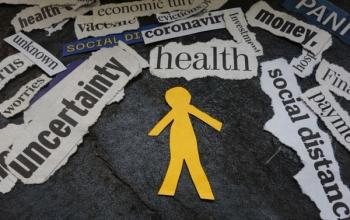
What medical condition is most frequently reported with comorbid mood and anxiety disorders? Take the quiz and learn more.

What medical condition is most frequently reported with comorbid mood and anxiety disorders? Take the quiz and learn more.

Mindfulness is an effective tool to reduce stress and bring us to the present moment.

Nearly 40% of physicians are reluctant to seek medical care for a mental health condition. There is discrimination in medical licensing, difficulty retaining hospital privileges, and interruptions in professional advancement. A secret remains untreated and stigma continues.

While it may be challenging to differentiate between OCD and other anxiety disorders, using a multi-informant assessment and understanding the content of a patient’s fears is a fundamental start to outlining an effective treatment plan.

In this video, Neda F. Gould, PhD, discusses her work in mindfulness for patients as well as faculty. She describes what mindfulness is and how it can be useful for stress management, and she will walk through a practice session.

Joseph Cofrancesco Jr, MD, MPH, remembers his brother who died of complications from COVID-19, intubated, sedated, and alone.

Unprecedented numbers of Americans are losing their jobs. When patients describe psychiatric symptoms (eg, anxiety, insomnia, irritability), psychiatrists should ask about workplace issues.

In just 3 months, the virus has changed the lives of our psychiatric patients and of psychiatry forever. What are the next best steps?

The 90s were the decade of the brain. We thought we could master science, but the more we learn, the more complex things become. Sandra Steingard, MD, shares her thoughts in this video.

Practical suggestions about how we can approach these stressful times in peace and joy.

Amidst the fear, worry, and uncertainty surrounding the coronavirus pandemic, each day seems to bring news that is worse than the day before.

How can psychiatry constructively address our nation’s crisis?

Emergency Psychiatry: Principles and Practice has something for everyone and is easily applicable to emergency and primary care.

Thoughts on how we celebrate with our patients when they achieve a milestone in their work or convey a more finely tuned awareness of themselves.

The economic fallout of the pandemic may continue for years resulting in prolonged unemployment and an increasing percentage of the population with untreated serious mental health problems.

Dr Jessi Gold provides quick tips for health care professionals to practice self-care during this difficult time.

As we get past the surge (fingers crossed) of COVID-19, the two most striking pathologies we are seeing are a much greater volume than usual of delirium as well as persistent encephalopathy.

After so many weeks of sheltering in place, watching the news, and not going to restaurants or other public places due to the pandemic, how do we re-engage and re-integrate slowly and maintain calm?

In this podcast, psychiatrists from the Group for Advancement of Psychiatry, Work and Organizations committee walk us through assessing how a patient's work ties to their sense of identity. They describe ways to validate a patient's feelings, provide reassurance, and help manage their emotions.

Beyond unsettling our minds, the current pandemic unsettles our souls in ways we are just beginning to understand. Just as the COVID-19 virus attacks the respiratory tract, the pandemic itself can assault the soul. Dr Pies identifies five manifestations of the crisis.

In this video, Samantha Gnanasegaram, MD, a psychiatrist New Hampshire Hospital, Concord, NH, talks about the challengers of being a clinician in the days of the coronavirus pandemic.

Some health care workers have been particulary vulnerable to the stress of uncertainty and loss of control engendered by the COVID-19 pandemic, illustrated by 3 cases presented here.

Shifting the internal narrative can enhance resilience.

Guidance for mental health care practitioners to better explain the complexities of the current crisis to their patients.

Yujuan Choy, MD, Chief Psychiatrist at UC Irvine Counseling Center, provides tips for working with patients whose anxiety symptoms disrupt their quality of life.